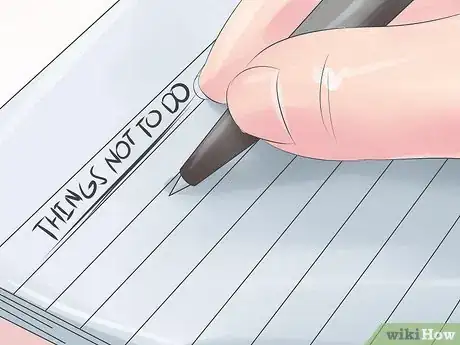This article was co-authored by Catherine Boswell, PhD. Dr. Catherine Boswell is a Licensed Psychologist and a Co-Founder of Psynergy Psychological Associates, a private therapy practice based in Houston, Texas. With over 15 years of experience, Dr. Boswell specializes in treating individuals, groups, couples, and families struggling with trauma, relationships, grief, and chronic pain. She holds a Ph.D. in Counseling Psychology from the University of Houston. Dr. Bowell has taught courses to Master’s level students at the University of Houston. She is also an author, speaker, and coach.
wikiHow marks an article as reader-approved once it receives enough positive feedback. In this case, 100% of readers who voted found the article helpful, earning it our reader-approved status.
This article has been viewed 77,051 times.
It's easy to get yourself stuck in a rut, and even if you want to move forward with your life, you may not know where to start. Before you can gain any momentum, you'll need to know which behaviors you have to drop and which you'll need to pick up. Once you gain an understanding of this, you can begin taking the first few steps forward into a better tomorrow.
Steps
What You Need to Stop Doing
-
1Let go of past failures and pains.[1] Regret, guilt, and fixation on the bad things that happened in your past can prevent you from moving forward in the present and into the future. You can no longer control the past, but you can prevent the past from controlling you.[2]
- Consider mistakes you made in the past that you don't want to repeat. Gather any practical lessons you can from those mistakes and let go of any theoretical fears surrounding those mistakes.[3] For instance, a child may burn himself by touching a hot stove and thereby learn not to touch other hot stoves, but that experience does not need to prevent that child from touching and exploring other parts of his world.
- Past interactions with people can cause you to develop grudges against them, but grudges also drain you of your own energy and resources and ultimately hold you back.
-
2Don't surrender control to other people. Your life is yours to live. Others may offer guidance and advice. Some of this can be helpful, and some of it can be hurtful. Regardless, you need to make decisions based on your own desires and ideas without worrying about what others expect of you.
- Keep in mind that even the people closest to you have a limited understanding of who you are at the core.
- When you pursue a goal, some may criticize you if it does not fall in line with the things they view as important. For instance, your new passion may not make much money, so someone who values money as a high priority will likely view it as a waste of time. Remember that your values and others' values are not always the same, so running your life according to another's values will not bring satisfaction to your own life.
Advertisement -
3Decide to let go of indecisiveness. Failing to make a choice is a choice in itself. Train yourself to be a more decisive person. If you cling to your indecisiveness, you will continue to doubt yourself at the most crucial moments.
-
4Stop procrastinating now. Right now. You have an indefinite number of “tomorrows” to deal with, and telling yourself that you will start doing something “tomorrow” can quickly become a habit. Stop putting things off and start doing them immediately.
- Think of it this way: you may end up pursuing a wrong path, but the sooner you embark on that path, the quicker you can learn your error and set it right. Dragging out the journey will only limit your future opportunities.
-
5Quit running away. Problems and issues inevitably arise, and many of these issues cannot be avoided forever. The more time you waste on running away, the less time you have for moving forward.
- For instance, if there is a misunderstanding or other form of tension between you and someone else, try talking it out with that person. The relationship could break apart afterward, but it could also end up becoming stronger. Either way, the issue will only continue to fester in your life until you take care of it.
-
6Drop the excuses. Granted, there are often legitimate obstacles that may prevent you from pursuing a specific goal or idea, but oftentimes, something one considers to be an obstacle can be overcome with a little effort. When there is an obstacle that you can remedy, telling yourself that it prevents you from accomplishing something is simply an excuse, and these excuses need to stop.
-
7Release the need for explanations.[4] Things often happen in life without reason or sense. Wanting an explanation for something is natural, but fixating on that desire can actually hold you back if you refuse to act before you have an explanation.
-
8Realize and release your fears. Everyone has his or her own set of fears and anxieties. Be honest with yourself when identifying the fears that hold you back. Once you know what these fears are, work at letting them go.[5]
- Heartbreak is a major fear, especially for those who have already suffered from it. Understand that things can work out with another person even if they didn't work out with someone from your past.
- Another fear that haunts many people is fear of the unknown. Change is a scary thing—things can get better, or they can get worse. By avoiding possible evils that could lie around the corner, though, you end up forcing yourself to deal with current evils that definitely do exist already while depriving yourself of possible goods.
- Some people even fear success, especially if they do not like to stand out. Understand, however, that people who treat you poorly because of how you stand out are generally not worth impressing in the first place.
What You Need to Start Doing
-
1Accept imperfection. Nobody is perfect, after all. Mistakes are a part of life, and you will continue making mistakes regardless of what you do or don't do. The sooner you embrace the fact that you are imperfect, the quicker you can begin acting in spite of that fact.[6]
-
2Look at the positives and appreciate the present. It can be far too easy to focus on all the negative things in life. Instead of thinking about everything that's wrong, though, take a good look at everything that's right and good. Life is often better than one might perceive it to be.
- Think about the things you are fortunate to have and be grateful for them. Instead of bemoaning the fact that you can't afford to take an exciting vacation or buy an impressive car, think about the support you get from family and friends or the simple pleasures you can enjoy in your own neighborhood.
- You should even acknowledge the good in things you plan to give up. For instance, you might give up a career that you felt miserable in, but that career did provide you with a comfortable life. That, in itself, is something to be glad for.
-
3Focus on the future. Learn from your past, appreciate your present, and focus on your future. Thinking ahead to the life you want to have will give you something to pursue, and having something to pursue will make it easier to walk forward.
- In the midst of focusing on the future, you also need to make sure that you do not spend too much time worrying about it. Plan out what you can and form dreams, but don't sweat the little details. You can't control or predict everything, anyway.
- Concentrate on one definite goal and aim high. A definite goal gives you something to aim for. Having too many goals can scatter your energy in too many different directions, though. Since you are only focusing on one goal at a time, it is even more important to set goals that challenge you and make the most out of your capabilities.
-
4Believe in yourself. Be confident and be brave. Think about who you want to be, and reassure yourself that you already possess the basic qualifications you'll need in order to become that person.
- By thinking "as if" you are already the person you want to become, your behaviors and mental images will naturally begin to fall in line with those needed to actually become that person.
-
5Have a little self-compassion. Try not to be too hard on yourself when you do struggle. Moving forward is difficult for many people, and you're bound to take a step or two back once in a while. Show yourself a little compassion for your own weaknesses, but reassure yourself that those weaknesses do not define you.[7]
- Take comfort in old favorites. When the changes in your life threaten to overwhelm you, turn to familiar comforts to give yourself a rest. Watch a favorite movie, eat a favorite meal, or visit a favorite place.[8]
-
6Foster good relationships. Surrounding yourself with positive people will make it easier to maintain your own positive attitude. Drop as much drama as possible and nurture the relationships that provide you with the most strength.
- Be reasonable in your relationships and stop expecting people to act in certain ways. Allow yourself to be pleasantly surprised by positive interactions instead of being disappointed by negative interactions.
- Find someone reliable to talk to about your fears and insecurities. Make sure that this person can listen and advise you without letting his or her own issues interfere.
- When dealing with others, give without thinking of receiving in return. Sometimes your dedication will be returned in kind; other times, it won't be. Regardless, you will build the skills and attitude needed to maintain meaningful relationships as a result of your own actions.
-
7Do what you love and love what you do. One of the easiest ways to build passion is to focus on the things that you already love or have a strong interest in. By doing what you love on a daily basis, you will likely end up loving your everyday life.
- Look at your habits and interests and determine if there is any way to profit from them.
Taking the First Steps Forward
-
1Make a "stop doing" list. Many people do things they think they should do, rather than things that they want to do. Oftentimes, even the things you think you should do are not even necessary. Take the time to sit down and make a list of all the things you “should” do that aren't actually necessary or desirable.
- To figure out what you need to stop doing, ask yourself which things are draining your enthusiasm and stopping you from reaching your goals. Of these things, honestly ask yourself which are necessary and which are only done out of a misplaced sense of obligation.
- Make sure that the things on your "stop doing" list are legitimate problems. For example, you might think that you're unhappy with your marriage when, in actuality, you're unhappy at work and allowing that dissatisfaction to bleed into other areas of your life.
-
2Focus on the "can do" portions first. A big goal can seem daunting, so break it down into smaller parts. Chances are, there is at least one action you can take right now to make your dream a reality. Discover that action and start doing it.[9]
- For instance, if you want to start a new business, you can take the first step by starting a blog and various social media accounts for that business. Once you have something tangible to look at, it might be easier to do the research you need to do before pursuing the next tangible step.
-
3Help people with similar problems. Finding the solution to your own problems can be difficult because it is impossible for you to view things objectively. On the other hand, helping someone solve their own problems can allow you to be an objective observer. You can then take what you've learned by helping others and apply the knowledge to your own circumstances.
-
4Take a trip.[10] Taking in a fresh scenery can often change your whole perspective on life. If you struggle with taking your first steps forward while in the midst of your everyday routine, change things up a bit by taking a short trip.
- Taking a trip also forces you to think in the present rather than dwelling on the past or worrying about the future.
- You can also make this into a practical exercise by going to a seminar, conference, or event related to a new career or interest you want to pursue.
-
5Try something new. Another way to change your daily routine and work yourself out of your rut is to simply try something you've never done before. The change does not need to be anything immensely exciting or daring, but it should be something that interests you even though it lies just outside of your usual comfort zone.
- For example, sing karaoke somewhere to break yourself out of your shell or take a class on something you've never tried—whether it's kickboxing or cake decorating. Get creative and stretch yourself.
Expert Q&A
Did you know you can get expert answers for this article?
Unlock expert answers by supporting wikiHow
-
QuestionHow do you motivate yourself to move forward?
 Tracey Rogers, MATracey L. Rogers is a Certified Life Coach and Professional Astrologer based in Philadelphia. Tracey has over 10 years of life coaching and astrology experience. Her work has been featured on nationally syndicated radio, as well as online platforms such as Oprah.com. She is certified as a Coach by the Life Purpose Institute, and she has an MA in International Education from George Washington University.
Tracey Rogers, MATracey L. Rogers is a Certified Life Coach and Professional Astrologer based in Philadelphia. Tracey has over 10 years of life coaching and astrology experience. Her work has been featured on nationally syndicated radio, as well as online platforms such as Oprah.com. She is certified as a Coach by the Life Purpose Institute, and she has an MA in International Education from George Washington University.
Certified Life Coach
-
QuestionWhat can I say instead of moving forward?
 Tracey Rogers, MATracey L. Rogers is a Certified Life Coach and Professional Astrologer based in Philadelphia. Tracey has over 10 years of life coaching and astrology experience. Her work has been featured on nationally syndicated radio, as well as online platforms such as Oprah.com. She is certified as a Coach by the Life Purpose Institute, and she has an MA in International Education from George Washington University.
Tracey Rogers, MATracey L. Rogers is a Certified Life Coach and Professional Astrologer based in Philadelphia. Tracey has over 10 years of life coaching and astrology experience. Her work has been featured on nationally syndicated radio, as well as online platforms such as Oprah.com. She is certified as a Coach by the Life Purpose Institute, and she has an MA in International Education from George Washington University.
Certified Life Coach
-
QuestionHow can I move on after a breakup?
 Tracey Rogers, MATracey L. Rogers is a Certified Life Coach and Professional Astrologer based in Philadelphia. Tracey has over 10 years of life coaching and astrology experience. Her work has been featured on nationally syndicated radio, as well as online platforms such as Oprah.com. She is certified as a Coach by the Life Purpose Institute, and she has an MA in International Education from George Washington University.
Tracey Rogers, MATracey L. Rogers is a Certified Life Coach and Professional Astrologer based in Philadelphia. Tracey has over 10 years of life coaching and astrology experience. Her work has been featured on nationally syndicated radio, as well as online platforms such as Oprah.com. She is certified as a Coach by the Life Purpose Institute, and she has an MA in International Education from George Washington University.
Certified Life Coach Relationships can be difficult. I'd encourage you to start by looking at how you could be a better partner, and really take a good honest look at what happened there. Then, forget about it. Take those lessons and force yourself to get back out there. Take what you learned from the last relationship and use that to figure out what you're looking for in your next partner!
Relationships can be difficult. I'd encourage you to start by looking at how you could be a better partner, and really take a good honest look at what happened there. Then, forget about it. Take those lessons and force yourself to get back out there. Take what you learned from the last relationship and use that to figure out what you're looking for in your next partner!
References
- ↑ https://www.psychologytoday.com/us/blog/the-adaptive-mind/202002/how-let-go-the-past
- ↑ Tracey Rogers, MA. Certified Life Coach. Expert Interview. 6 January 2020.
- ↑ Catherine Boswell, PhD. Licensed Psychologist. Expert Interview. 29 December 2020.
- ↑ https://www.psychologytoday.com/us/blog/emotional-fitness/201608/10-reasons-keep-moving-forward
- ↑ Tracey Rogers, MA. Certified Life Coach. Expert Interview. 6 January 2020.
- ↑ Catherine Boswell, PhD. Licensed Psychologist. Expert Interview. 29 December 2020.
- ↑ Catherine Boswell, PhD. Licensed Psychologist. Expert Interview. 29 December 2020.
- ↑ https://www.health.harvard.edu/mental-health/4-ways-to-boost-your-self-compassion
- ↑ Tracey Rogers, MA. Certified Life Coach. Expert Interview. 6 January 2020.


















































































